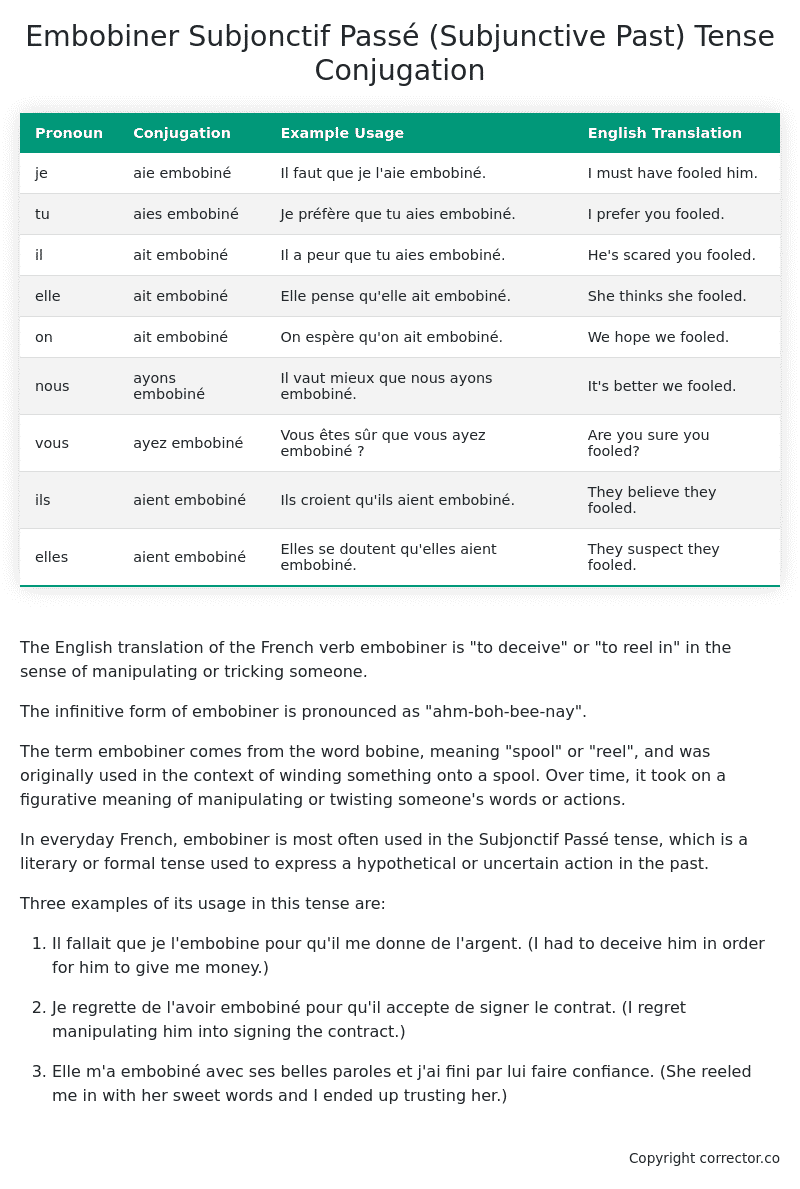Subjonctif Passé (Subjunctive Past) Tense Conjugation of the French Verb embobiner
Introduction to the verb embobiner
The English translation of the French verb embobiner is “to deceive” or “to reel in” in the sense of manipulating or tricking someone.
The infinitive form of embobiner is pronounced as “ahm-boh-bee-nay”.
The term embobiner comes from the word bobine, meaning “spool” or “reel”, and was originally used in the context of winding something onto a spool. Over time, it took on a figurative meaning of manipulating or twisting someone’s words or actions.
In everyday French, embobiner is most often used in the Subjonctif Passé tense, which is a literary or formal tense used to express a hypothetical or uncertain action in the past.
Three examples of its usage in this tense are:
-
Il fallait que je l’embobine pour qu’il me donne de l’argent. (I had to deceive him in order for him to give me money.)
-
Je regrette de l’avoir embobiné pour qu’il accepte de signer le contrat. (I regret manipulating him into signing the contract.)
-
Elle m’a embobiné avec ses belles paroles et j’ai fini par lui faire confiance. (She reeled me in with her sweet words and I ended up trusting her.)
Table of the Subjonctif Passé (Subjunctive Past) Tense Conjugation of embobiner
| Pronoun | Conjugation | Example Usage | English Translation |
|---|---|---|---|
| je | aie embobiné | Il faut que je l’aie embobiné. | I must have fooled him. |
| tu | aies embobiné | Je préfère que tu aies embobiné. | I prefer you fooled. |
| il | ait embobiné | Il a peur que tu aies embobiné. | He’s scared you fooled. |
| elle | ait embobiné | Elle pense qu’elle ait embobiné. | She thinks she fooled. |
| on | ait embobiné | On espère qu’on ait embobiné. | We hope we fooled. |
| nous | ayons embobiné | Il vaut mieux que nous ayons embobiné. | It’s better we fooled. |
| vous | ayez embobiné | Vous êtes sûr que vous ayez embobiné ? | Are you sure you fooled? |
| ils | aient embobiné | Ils croient qu’ils aient embobiné. | They believe they fooled. |
| elles | aient embobiné | Elles se doutent qu’elles aient embobiné. | They suspect they fooled. |
Other Conjugations for Embobiner.
Le Present (Present Tense) Conjugation of the French Verb embobiner
Imparfait (Imperfect) Tense Conjugation of the French Verb embobiner
Passé Simple (Simple Past) Tense Conjugation of the French Verb embobiner
Passé Composé (Present Perfect) Tense Conjugation of the French Verb embobiner
Futur Simple (Simple Future) Tense Conjugation of the French Verb embobiner
Futur Proche (Near Future) Tense Conjugation of the French Verb embobiner
Plus-que-parfait (Pluperfect) Tense Conjugation of the French Verb embobiner
Passé Antérieur (Past Anterior) Tense Conjugation of the French Verb embobiner
Futur Antérieur (Future Anterior) Tense Conjugation of the French Verb embobiner
Subjonctif Présent (Subjunctive Present) Tense Conjugation of the French Verb embobiner
Subjonctif Passé (Subjunctive Past) Tense Conjugation of the French Verb embobiner (this article)
Subjonctif Imparfait (Subjunctive Imperfect) Tense Conjugation of the French Verb embobiner
Subjonctif Plus-que-parfait (Subjunctive Pluperfect) Tense Conjugation of the French Verb embobiner
Conditionnel Présent (Conditional Present) Tense Conjugation of the French Verb embobiner
Conditionnel Passé (Conditional Past) Tense Conjugation of the French Verb embobiner
L’impératif Présent (Imperative Present) Tense Conjugation of the French Verb embobiner
L’infinitif Présent (Infinitive Present) Tense Conjugation of the French Verb embobiner
Struggling with French verbs or the language in general? Why not use our free French Grammar Checker – no registration required!
Get a FREE Download Study Sheet of this Conjugation 🔥
Simply right click the image below, click “save image” and get your free reference for the embobiner Subjonctif Passé tense conjugation!

Embobiner – About the French Subjonctif Passé (Subjunctive Past) Tense
Formation of the Subjonctif Passé
Everyday Usage Patterns
Interactions with Other Tenses
Present tense
Future tense
Conditional
Summary
I hope you enjoyed this article on the verb embobiner. Still in a learning mood? Check out another TOTALLY random French verb conjugation!


